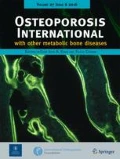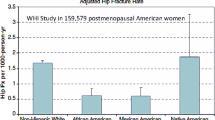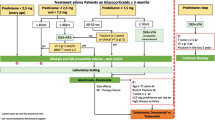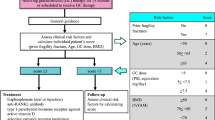Abstract
A European Union (EU) directive on vitamins and minerals used as ingredients of food supplements with a nutritional or physiological effect (2002/46/EC) was introduced in 2003. Its implications for the use of oral supplements of calcium and vitamin D in the prevention and treatment of osteoporosis were discussed at a meeting organized with the help of the World Health Organization (WHO) Collaborating Center for Public Health Aspects of Rheumatic Diseases (Liège, Belgium) and the support of the WHO Collaborating Center for Osteoporosis Prevention (Geneva, Switzerland). The following issues were addressed: Is osteoporosis a physiological or a medical condition? What is the evidence for the efficacy of calcium and vitamin D in the management of postmenopausal osteoporosis? What are the risks of self-management by patients in osteoporosis? From their discussions, the panel concluded that: (1) osteoporosis is a disease that requires continuing medical attention to ensure optimal therapeutic benefits; (2) when given in appropriate doses, calcium and vitamin D have been shown to be pharmacologically active (particularly in patients with dietary deficiencies), safe, and effective for the prevention and treatment of osteoporotic fractures; (3) calcium and vitamin D are an essential, but not sufficient, component of an integrated management strategy for the prevention and treatment of osteoporosis in patients with dietary insufficiencies, although maximal benefit in terms of fracture prevention requires the addition of antiresorptive therapy; (4) calcium and vitamin D are a cost-effective medication in the prevention and treatment of osteoporosis; (5) it is apparent that awareness of the efficacy of calcium and vitamin D in osteoporosis is still low and further work needs to be done to increase awareness among physicians, patients, and women at risk; and (6) in order that calcium and vitamin D continues to be manufactured to Good Manufacturing Practice standards and physicians and other health care professionals continue to provide guidance for the optimal use of these agents, they should continue to be classified as medicinal products.



Similar content being viewed by others
References
European Commission (2002) Directive 2002/46/EC of the European parliament and of the Council. Official Journal of the European Communities. L183:51–57
Melton LJ, Chrischilles EA, Cooper C et al (1992) Perspective: how many women have osteoporosis? J Bone Miner Res 7:1005–1010
Kanis JA, Johnell O, Oden A et al (2000) Long-term risk of osteoporotic fracture in Malmö. Osteoporos Int 11:669–674
Ismail AA, Cooper C, Felsenberg D et al (1999) Number and type of vertebral deformities: epidemiological characteristics and relation to back pain and height loss. European Vertebral Osteoporosis Study Group. Osteoporos Int 9:206–213
Gold DT (1996) The clinical impact of vertebral fractures: quality of life in women with osteoporosis. Bone 18[Suppl 3]:185S-189S
Schlaich C, Minne HW, Brucker T et al (1998) Reduced pulmonary function in patients with spinal osteoporotic fractures. Osteoporos Int 8:261–267
Nevitt MC, Ettinger B, Black DM et al (1998) The association of radiographically detected vertebral fractures with back pain and function: a prospective study. Ann Intern Med 128:793–800
Lips P, Cooper C, Agnusdei D et al (1999) Quality of life in patients with vertebral fractures: validation of the Quality of Life Questionnaire for the European Foundation for Osteoporosis (QUALEFFO). Osteoporos Int 10:150–160
Pluijm SMF, Dik MG, Jonker C et al (2002) Effects of gender and age on the association of apolipoprotein E ε4 with bone mineral density, bone turnover and the risk of fractures in older people. Osteoporos Int 13:701–709
Hall SE, Criddle RA, Comito TL et al (1999) A case-control study of quality of life and functional impairment in women with long-standing vertebral osteoporotic fracture. Osteoporos Int 9:508–515
Gold DT (2001) The nonskeletal consequences of osteoporotic fractures: psychologic and social outcomes. Rheum Dis Clin North Am 27:255–262
Robbins J, Hirsch C, Whitmer R et al (2001) The association of bone mineral density and depression in an older population. J Am Geriatr Soc 49:732–736
Lyles KW (2001) Osteoporosis and depression: shedding more light upon a complex relationship. J Am Geriatr Soc 49:827–828
Tosteson ANA, Gabriel SE, Grove MR et al (2001) Impact of hip and vertebral fractures on quality-adjusted life years. Osteoporos Int 12:1042–1049
Oleksik A, Lips P, Dawson A et al (2000) Health-related quality of life in postmenopausal women with low BMD with or without prevalent vertebral fractures. J Bone Miner Res 15:1384–1392
Hall SE, Criddle RA, Comito TL, Prince RL (1999) A case-control study of quality of life and functional impairment in women with long-standing vertebral osteoporotic fracture. Osteoporos Int 9:508–515
Adachi JD, Ioannidis G, Olszynski WP et al (2002) The impact of incident vertebral and non-vertebral fractures on health related quality of life in postmenopausal women. BMC Musculoskelet Disord 3:11–18
Keene GS, Parker MJ, Pryor GA (1993) Mortality and morbidity after hip fractures. BMJ 307:1248–1250
Schürch MA, Rizzoli R, Mermillod B et al (1996) A prospective study of socioeconomic aspects of fracture of the proximal femur. J Bone Miner Res 11:1935–1942
Reginster J-Y, Gillet P, Sedrine WB et al (1999) Direct costs of hip fractures in patients over 60 years of age in Belgium. Pharmacoeconomics 15:507–514
Autier P, Haentjens P, Bentin J et al (2000) Costs induced by hip fractures: a prospective controlled study in Belgium. Belgian Hip Fracture Study Group. Osteoporos Int 11:373–380
Cree M, Soskolne CL, Belseck E et al (2000) Mortality and institutionalization following hip fracture. J Am Geriatr Soc 48:283–288
Kiebzak GM, Beinart GA, Perser K et al (2002) Undertreatment of osteoporosis in men with hip fracture. Arch Intern Med 162:2217–2222
Center JR, Nguyen TV, Schneider D et al (1999) Mortality after all major types of osteoporotic fracture in men and women: an observational study. Lancet 353:878–882
Trombetti A, Herrmann F, Hoffmeyer P et al (2002) Survival and potential years of life lost after hip fracture in men and age-matched women. Osteoporos Int 13:731–737
Cauley JA, Thompson DE, Ensrud KC et al (2000) Risk of mortality following clinical fractures. Osteoporos Int 11:556–561
Ismail AA, O’Neill TW, Cooper C et al (1998) Mortality associated with vertebral deformity in men and women; results from the European Prospective Osteoporosis Study (EPOS). Osteoporos Int 8:291–297
Cummings SR, Black DM, Rubin SM (1989) Lifetime risks of hip, Colles’, or vertebral fracture and coronary heart disease among white postmenopausal women. Arch Intern Med 149:2445–2448
Lippuner K, von Overbeck J, Perrelet R et al (1997) Incidence and direct medical costs of hospitalizations due to osteoporotic fractures in Switzerland. Osteoporos Int 7:414–425
International Osteoporosis Foundation (1999) Survey by Helmut Minne, November 1999. http://www.osteofound.org. Cited 3 October 2003
Colditz GA, Manson JE, Hankinson SE (1997) The Nurse’s Health Study: 20-year contribution to the understanding of health among women. J Womens Health 6:49–62
The Osteoporosis Methodology Group and the Osteoporosis Research Advisory Group (2002) Meta-analyses of therapies for postmenopausal osteoporosis. Endocr Rev 23:496–507
Häuselmann HJ, Rizzoli R (2003) A comprehensive review of treatments for postmenopausal osteoporosis. Osteoporos Int 14:2–12
Heaney RP (1993) Nutritional factors in osteoporosis. Ann Rev Nutr 13:287–316
Välimäki MJ, Kärkkäinen M, Lamberg-Allardt C et al (1994) Exercise, smoking and calcium intake during adolescence and early adulthood as determinants of peak bone mass. BMJ 309:230–235
Bonjour JP, Carrie AL, Ferrari S et al (1997) Calcium-enriched foods and bone mass growth in prepubertal girls: a randomized, double-blind, placebo-controlled trial. J Clin Invest 99:1287–1294
Lehtonen-Veromaa MKM, Möttönen TT, Nuotio IO et al (2002) Vitamin D and attainment of peak bone mass among peripubertal Finnish girls: a 3-year prospective study. Am J Clin Nutr 76:1446–1453
Boonen S, Vanderschueren D, Cheng XG et al (1997) Age-related (type II) femoral neck osteoporosis in men: biochemical evidence for both hypovitaminosis D- and androgen deficiency-induced bone resorption. J Bone Miner Res 12:2119–2126
Boonen S, Aerssens J, Dequeker J (1996) Age-related endocrine deficiencies and fractures of the proximal femur, II: implications of vitamin D deficiency in the elderly. J Endocrinol 149:13–17
Boonen S, Lesaffre E, Dequeker J et al (1996) Relationship between baseline insulin-like growth factor-I and femoral bone density in women aged over 70 years: potential implications for the prevention of age-related bone loss. J Am Geriatr Soc 44:1301–1306
Boonen S, Broos P, Verbeke G et al (1997) Calciotrophic hormones and markers of bone remodeling in age-related (type II) femoral neck osteoporosis: alterations consistent with secondary hyperparathyroidism-induced bone resorption. J Gerontol 52A:M286–M293
Reginster J-Y, Deroisy R, Pirenne H et al (1999) High prevalence of low femoral bone mineral density in elderly women living in nursing homes or community-dwelling: a plausible role of increased parathyroid hormone secretion. Osteoporos Int 9:121–128
Lips P (2001) Vitamin D deficiency and secondary hyperparathyroidism in the elderly: consequences for bone loss and fractures and therapeutic implications. Endocr Rev 22:477–501
McKenna MJ, Freaney R (1998) Secondary hyperparathyroidism in the elderly: means to defining hypovitaminosis D. Osteoporos Int 8[Suppl 2]:S3–S6
Chapuy MC, Preziosi P, Maamer M et al (1997) Prevalence of vitamin D insufficiency in an adult normal population. Osteoporos Int 7:439–443
Thomas MK, Lloyd-Jones DM, Thadhani RI et al (1998) Hypovitaminosis D in medical inpatients. N Engl J Med 338:777–783
Malabanan AO, Veronikis IE, Holick MF (1998) Redefining vitamin D insufficiency. Lancet 351:805–806
Lips P, Duong T, Oleksik AM et al for the Multiple Outcomes of Raloxifene Evaluation Study Group (2001) A global study of vitamin D status and parathyroid function in postmenopausal women with osteoporosis: baseline data from the multiple outcomes of raloxifene evaluation clinical trial. J Clin Endocrinol Metab 86:1212–1221
Pattanaungkul S, Riggs BL, Yergey AL et al (2000) Relationship of intestinal calcium absorption to 1,25-dihydroxyvitamin D[1,25(OH)2D] levels in young versus elderly women: evidence for age-related intestinal resistance to 1,25(OH)2D action. J Clin Endocrinol Metab 85:4023–4027
Villareal DT, Civitelli R, Chines A et al (1991) Subclinical vitamin D deficiency in postmenopausal women with low vertebral bone mass. J Clin Endocrinol Metab 72:628–634
Thiébaud D, Burckhardt P, Costanza M et al (1997) Importance of albumin, 25(OH)-vitamin D and IGFBP-3 as risk factors in elderly women and men with hip fracture. Osteoporos Int 7:457–462
LeBoff MS, Kohlmeier L, Hurwitz S et al (1999) Occult vitamin D deficiency in postmenopausal US women with acute hip fracture. JAMA 281:1505–1511
Yates AA, Schlicker SA, Suitor CW (1998) Dietary Reference Intakes: the new basis for recommendations for calcium and related nutrients, B vitamins, and choline. J Am Diet Assoc 98:699–706
European Commission (1998) Report on osteoporosis in the European Community: action on prevention. Luxembourg Office for Official Publications of the European Communities, p 112
European Commission Scientific Committee on Food (2002) Opinion of the Scientific Committee on Food on the tolerable upper intake level of calcium. European Commission, Brussels
Hochberg Z, Bereket A, Davenport M et al (2002) Consensus development for the supplementation of vitamin D in childhood and adolescence. Horm Res 5839–5851
Holick MF (1998) Vitamin D requirements for humans of all ages: new increased requirements for women and men 50 years and older. Osteoporos Int 8[Suppl 2]:S24–S29
Lips P, Wiersinga A, Ginkel van FC et al (1988) The effect of vitamin D supplementation on vitamin D status and parathyroid function in elderly subjects. J Clin Endocrinol Metab 67:644–650
Lips P, Graafmans WC, Ooms ME et al (1996) Vitamin D supplementation and fracture incidence in elderly persons: a randomized, placebo-controlled clinical trial. Ann Intern Med 124:400–406
Ooms ME, Roos JC, Bezemer PD et al (1995) Prevention of bone loss by vitamin D supplementation in elderly women: a randomized double-blind trial. J Clin Endocrin Metab 80:1052–1058
Vieth R, Chan P-CR, MacFarlane GD (2001) Efficacy and safety of vitamin D3 intake exceeding the lowest observed adverse effect level. Am J Clin Nutr 73:288–294
European Commission Scientific Committee on Food (2002) Opinion of the Scientific Committee on Food on the tolerable upper intake level of vitamin D. European Commission, Brussels
Chapuy MC, Schott AM, Garnero P et al (1996) Healthy elderly French women living at home have secondary hyperparathyroidism and high bone turnover in winter. EPIDOS Study Group. J Clin Endocrinol Metab 81:1129–1133
Chapuy MC, Pamphile R, Paris E et al (2002) Combined calcium and vitamin D3 supplementation in elderly women: confirmation of reversal of secondary hyperparathyroidism and hip fracture risk: the Decalyos II Study. Osteoporos Int 13:257–264
Chapuy MC, Arlot ME, Duboeuf F et al (1992) Vitamin D3 and calcium to prevent hip fractures in elderly women. N Engl J Med 327:1637–1642
Chapuy MC, Arlot ME, Delmas PD et al (1994) Effect of calcium and cholecalciferol treatment for three years on hip fractures in elderly women. BMJ 308:1081–1082
Meunier PJ, Chapuy MC, Arlot ME et al (1994) Can we stop bone loss and prevent hip fractures in the elderly? Osteoporos Int 4[Suppl 1]:S71–S76
Lips P, Chapuy MC, Dawson-Hughes B et al (1999) An international comparison of serum 25-hydroxyvitamin D measurements. Osteoporos Int 9:394–397
Dawson-Hughes B, Harris SS, Krall EA et al (1997) Effect of calcium and vitamin D supplementation on bone density in men and women 65 years of age or older. N Engl J Med 337:670–676
Trivedi DP, Doll R, Khaw KT (2003) Effect of four monthly oral vitamin D3 (cholecalciferol) supplementation on fractures and mortality in men and women living in the community: randomised double blind controlled trial. BMJ 326:469–472
Meyer HE, Smedshaug GB, Kvaavik E et al (2002) Can vitamin D supplementation reduce the risk of fracture in the elderly? a randomized controlled trial. J Bone Miner Res 17:709–715
Shea B, Wells G, Cranney A et al (2002) Meta-analysis of calcium supplementation for the prevention of postmenopausal osteoporosis. Endocr Rev 23:552–559
Papadimitropoulos E, Wells G, Shea B et al (2002) Meta-analysis of the efficacy of vitamin D treatment in preventing osteoporosis in postmenopausal women. Endocr Rev 23:560–569
Gillespie WJ, Avenell A, Henry DA et al (2001) Vitamin D and vitamin D analogues for preventing fractures associated with involutional and post-menopausal osteoporosis. Cochrane Database Syst Rev 1:CD000227
Bischoff HA, Stahelin HB, Dick W et al (2003) Effects of vitamin D and calcium supplementation on falls: a randomized controlled trial. J Bone Miner Res 18:343–351
Pfeifer M, Begerow B, Minne HW et al (2000) Effects of a short-term vitamin D and calcium supplementation on body sway and secondary hyperparathyroidism in elderly women. J Bone Miner Res 15:1113–1118
Lilliu H, Pamphile R, Chapuy M-C et al (2003) Calcium-vitamin D3 supplementation is cost-effective in hip fractures prevention. Maturitas 44:299–305
European Agency for Evaluation of Medicinal Products (1999) Note for guidance on involutional osteoporosis in women, CPMP/EWP/552/95. European Agency for Evaluation of Medicinal Products, London
International Osteoporosis Foundation (2001) Osteoporosis in the European Community: a call to action—an audit of policy developments since 1998. http://www.osteofound.org/publications/pdf.eu_report.pdf. Cited 3 October 2003
Juby AG, Davis P (2001) A prospective evaluation of the awareness, knowledge, risk factors and current treatment of osteoporosis in a cohort of elderly subjects. Osteoporos Int 12:617–622
Dawson-Hughes B, Harris SS, Krall EA et al (2000) Effect of withdrawal of calcium and vitamin D supplements on bone mass in elderly men and women. Am J Clin Nutr 72:745–750
Romagnoli E, Colangeli I, Minisola S (2000) Awareness, attitudes and opinions on osteoporosis of primary care physicians working in the metropolitan area of Rome: a brief report. Aging Clin Exp Res 12:240–244
Cranney A, Guyatt G, Griffith L et al, the Osteoporosis Methodology Group and the Osteoporosis Research Advisory Group (2002) Meta-analyses of therapies for postmenopausal osteoporosis, IX: summary of meta-analyses of therapies for postmenopausal osteoporosis. Endocr Rev 23:570–578
Koster JC, Hockeng WHL, Mulder H (1996) Diminished effect of etidronate in vitamin D deficient osteopenic postmenopausal women. Eur J Clin Pharmacol 51:145–147
Masud T, Mulcahy B, Thompson AV et al (1998) Effects of cyclical etidronate combined with calcitriol versus cyclical etidronate alone on spine and femoral neck bone mineral density in postmenopausal osteoporotic women. Ann Rheum Dis 57:346–349
Nieves JW, Komar L, Cosman F et al (1998) Calcium potentiates the effect of estrogen and calcitonin on bone mass: review and analysis. Am J Clin Nutr 67:18–24
Sirola J, Kroger H, Sandini L et al (2003) Interaction of nutritional calcium and HRT in prevention of postmenopausal bone loss: a prospective study. Calcif Tissue Int 72(6):659
Adebowale AO, Cox DS, Liang Z et al (2000) Analysis of glucosamine and chondroitin sulfate content in marketed products and the caco-2 permeability of chondroitin sulfate raw materials. J Am Nutr Assoc 3:37–44
Heaney RP, Barger-Lux MJ (2002) Not all calcium carbonate supplements are equally absorbable. 24th annual meeting ASBMR
Acknowledgements
This paper reports the conclusions from an international expert meeting organized in Barcelona on 10 November 2002, under the auspices of the World Health Organization Collaborating Center for Public Health Aspects of Rheumatic Diseases (Liège, Belgium) and supported in part by an unrestricted educational grant from Nycomed, Novartis, Shire and Orion Pharma. Dr S. Boonen is senior clinical investigator of the Fund for Scientific Research, Flanders, Belgium (F.W.O–Vlaanderen).
Author information
Authors and Affiliations
Corresponding author
Rights and permissions
About this article
Cite this article
Boonen, S., Rizzoli, R., Meunier, P.J. et al. The need for clinical guidance in the use of calcium and vitamin D in the management of osteoporosis: a consensus report. Osteoporos Int 15, 511–519 (2004). https://doi.org/10.1007/s00198-004-1621-6
Received:
Accepted:
Published:
Issue Date:
DOI: https://doi.org/10.1007/s00198-004-1621-6




